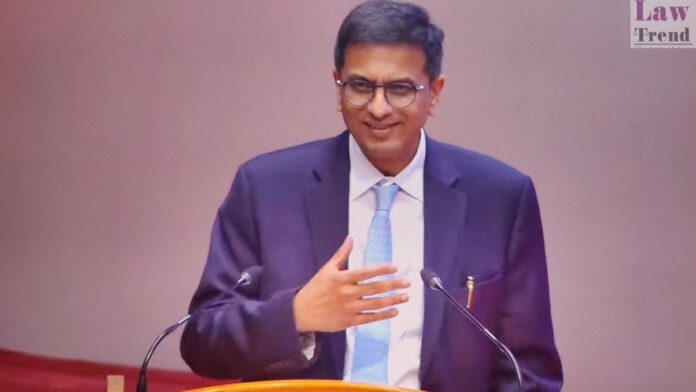Chief Justice of India Dr. D.Y. Chandrachud, while speaking today at a function organised by the Supreme Court Bar Association on the eve of his retirement as Chief Justice of India, candidly addressed the challenges, reforms, and personal experiences during his tenure as the head of the Indian judiciary. His remarks shed light on the monumental efforts undertaken to streamline the functioning of the Supreme Court, the rising pendency of cases, and the intense scrutiny he has faced as the country’s top judge.
“We Are Not Knight Errands, Governed by Law”
CJI Chandrachud began by emphasizing the nuanced role of courts in addressing injustice. “In court, you cannot cure all injustices which come onto your plate. Some are within the realm of law, while others are beyond what the courts can do. We are not knight errants, and we are governed by law,” he remarked. He underscored that the judiciary’s strength lies in its ability to hear cases with empathy and diligence. “The healing in court lies in your ability to hear well,” he added.
Broad Shoulders for Criticism
Reflecting on his personal journey, the Chief Justice noted the inevitable exposure to public criticism that comes with such a role. “I have exposed my personal life to public knowledge, and you expose yourself to criticism. But so be it. My shoulders are broad enough to accept all the criticism,” he stated, demonstrating resilience in the face of adversity.
Streamlining the Supreme Court: A Herculean Task
CJI Chandrachud outlined the extensive administrative reforms he spearheaded to modernize and expedite case management in the Supreme Court. When he assumed office, “1,500 files were stashed in the locker of the registrar,” he revealed, underscoring the chaotic state of affairs.
To address the mounting backlog of cases, committees were formed, case categorizations were overhauled, and pending case data was made publicly accessible. From November 9, 2022, to November 1, 2024, the court achieved significant milestones:
– 1.11 lakh cases were filed
– 5.33 lakh cases were listed
– 1.07 lakh cases were disposed of
CJI Chandrachud corrected misconceptions about case pendency. “You read somewhere that pendency in the Supreme Court has gone up to 82,000 cases. I want to give you the raw data. On January 1, 2020, 79,000 cases were pending, including defective cases. By January 1, 2024, that number reduced to 82,000, which includes both registered and unregistered cases—down by 11,000 in two years.”
He further detailed the increase in case filings. “In 2020, 29,000 cases were filed in the Supreme Court. In 2023, 54,000 cases were filed, and in 2024, 60,000 cases are expected to be filed. Despite this doubling in filings, we have reduced the pendency of regular cases from 28,682 to 22,000,” he noted, crediting efficient scheduling and proactive decision-making.
Collegium Unity and Tough Decisions
Addressing the controversial collegium system, CJI Chandrachud highlighted the unity within the judiciary. “We never had a difference of opinion in the collegium. We knew that we are not here for personal agendas but to serve the institution,” he affirmed. He also lauded his colleagues for their dedication, especially in tackling bail matters, disclosing that 21,000 bail cases were filed, and an almost equivalent number—21,358—were disposed of.
The Weight of Trolling
CJI Chandrachud acknowledged the incessant trolling he has faced. “I hope you know the amount of trolling I have received. I am probably the most trolled judge across the system,” he said. However, he embraced the criticism with a touch of poetry:
Mukhalif se meri shaksiyat sawarti hai,
Mein dushmano ka bada ahteram karta hu.
(On a lighter note, he joked, “I wonder what will happen from Monday as all those who trolled me will be rendered unemployed!”)
A Legacy of Transformation
As CJI Chandrachud’s tenure continues, his remarks reflect a commitment to transparency, institutional reform, and judicial efficiency. Despite the personal and professional challenges, he remains resolute in his mission to uphold the rule of law and strengthen public trust in the judiciary.




